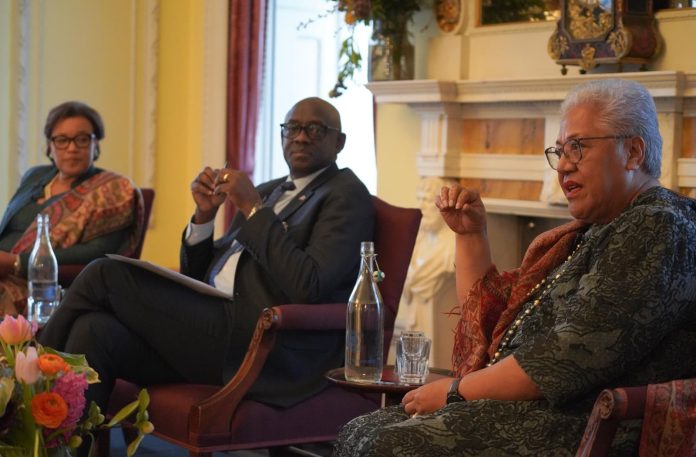The Prime Minister of Samoa, Fiame Naomi Mata’afa and the Commonwealth Secretary-General, Patricia Scotland, have called for stronger efforts to address the gender imbalance in leadership.
Both leaders noted that despite progress, women in positions of power remain rare.
Prime Minister Fiame Naomi Mata’afa was speaking on the theme ‘Women’s Leadership in the Commonwealth’ alongside the Secretary-General at a special edition of the Marlborough House Dialogues in London on 14 March 2023.
Addressing an audience of Commonwealth ministers, foreign ministers, high commissioners, civil society delegates and journalists, Prime Minister Mata’afa said:
“Only seven per cent of the world’s elected heads of government are women … To change this, women’s representation in the parliament needs to reach 50 per cent. This requires challenging the cultural impediments and social conditioning to create a more supportive environment for women to participate in politics.”
She continued: “Doing so is important because there is a direct correlation between the level of women’s representation in leadership and the level of national development.”
Drawing on her experience, the Samoan Prime Minister encouraged aspiring leaders to be self-aware and to understand their environment, adding that these two factors are essential to bringing about positive change. She further urged everyone to take full advantage of their constitutional rights and the opportunities offered to them.
The Prime Minister also spoke about Samoa’s unique social structures, including women’s committees, that enable women to lead on policy initiatives, including climate action, in their homes and villages.
However, with six out of 52 parliament seats held by women in Samoa, she noted that challenges remain in ensuring women’s perspectives inform decision-making on climate change at the national level.
In her opening remarks, the Secretary-General recognised the Prime Minister as one of the few women working at the highest level of political leadership, highlighting her achievements in breaking down barriers in politics.
She also acknowledged the remarkable progress made in Rwanda, the current Commonwealth Chair-In-Office, which, at 61 per cent, has the highest proportion of women members of parliament in the world.
Secretary-General Scotland further underscored that increased women’s participation in leadership leads to policymaking that promotes quality of life, a more participatory democracy, a stronger push for getting rid of unjust laws and greater action on social issues, such as gender-based violence.
Noting the significant under-representation of women in decision-making roles, the Secretary-General said the fact that women make up more than half of the world’s population should be enough to compel us to ensure equality in leadership.
“This is a question of justice and fairness, but it is about much more than the law of averages: it is about impact,” she told the attendees at the Commonwealth Secretariat’s headquarters.
Speaking about the climate crisis, the Commonwealth Secretary-General commended the Samoan Prime Minister’s leadership in mobilising greater climate action and international support for small island states.
“The intensifying impacts of climate change disproportionately affect women and girls,” she added while stressing that the most effective way to address this crisis is through inclusion.
Secretary-General Scotland continued:“This means ensuring more women are making decisions, not simply influencing policy and politics, but shaping it. If we can achieve this, we have a chance truly build back better.”
Both leaders agreed that women’s leadership is a necessity to achieve a sustainable and equitable future for all and encouraged countries to make full use of successful strategies, such as legally enforced quotas and appointments, to boost women’s representation in political leadership.
The in-person dialogue was moderated by Rwanda’s High Commissioner to the UK, Johnston Busingye, and took place following International Women’s Day and Commonwealth Day, both of which were observed in March.
SOURCE:COMSEC/PACNEWS













